Ramayana spreading Immortal Values across the Globe for many Millennia - Part 1
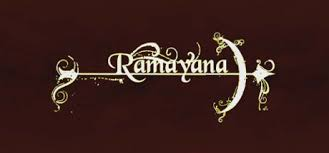 (NOTE: This is an expanded version of the FORWARD written to a book entitled Srimadramayanam. Global Hindu Heritage Foundation is pleased to acknowledge the extraordinary effort to the book entitled “Srimadramayanam” by Dr. S. R. S. Kolluri and Mrs. K. Padmaja which is aimed at providing thorough, well versed questions with answers to the readers who are thirsting for the knowledge about the entire story of Ramayana. Developing more than 1300 questions extracting from Ramayana is no ordinary task. Determination, patience, thorough knowledge and keen intellect are required to produce this kind of compendium. Congratulations are in order for this exceptional book. We appreciate Dr. Ghazal Srinivas for his futuristic vision to pass on these eternal characteristics in Ramayana to the future generations to inspire, imbibe and absorb in shaping their lives.
(NOTE: This is an expanded version of the FORWARD written to a book entitled Srimadramayanam. Global Hindu Heritage Foundation is pleased to acknowledge the extraordinary effort to the book entitled “Srimadramayanam” by Dr. S. R. S. Kolluri and Mrs. K. Padmaja which is aimed at providing thorough, well versed questions with answers to the readers who are thirsting for the knowledge about the entire story of Ramayana. Developing more than 1300 questions extracting from Ramayana is no ordinary task. Determination, patience, thorough knowledge and keen intellect are required to produce this kind of compendium. Congratulations are in order for this exceptional book. We appreciate Dr. Ghazal Srinivas for his futuristic vision to pass on these eternal characteristics in Ramayana to the future generations to inspire, imbibe and absorb in shaping their lives.
This book takes me to my younger years listening to numerous Haikathas on Ramayana and different characters good and bad. Vivid description of all the characters in Ramayana such as Rama, Sita, Lakshmana, Bharata, Hanuman, Ravana, Vibhishana, Jatayuvu, Sugriva, etc., imprinted in my evolving mind. Anybody who reads this book will also experience similar impressions that will remain with the readers forever. We encourage people of all generations to read and reap the benefits. The more we read, more we will be enriched. By Prakasarao Velagapudi, PhD)
Ramayana Acclaimed for Spreading Dharma
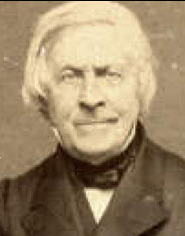 Ramayana is universally acclaimed by many scholars as one of the great treasures challenging the imagination. According to Jules Michelet, "There lies my great poem, as vast as the Indian Ocean, blessed, gilded with the sun, the book of divine harmony wherein is no dissonance. A serene peace reigns there, and in the midst of conflict an infinite sweetness, a boundless fraternity, which spreads over all living things, an ocean (without bottom or bound) of love, of pity, of clemency."
Ramayana is universally acclaimed by many scholars as one of the great treasures challenging the imagination. According to Jules Michelet, "There lies my great poem, as vast as the Indian Ocean, blessed, gilded with the sun, the book of divine harmony wherein is no dissonance. A serene peace reigns there, and in the midst of conflict an infinite sweetness, a boundless fraternity, which spreads over all living things, an ocean (without bottom or bound) of love, of pity, of clemency."
Ramayana was written by Sage Valmiki with utmost passion, eloquence and accuracy. This is considered as an Aadi Kaavya – the first poetic book. Valmiki was searching for a suitable hero to write a story in poetic form. One day he saw a hunter killing one of the bird couple and the agony and the heart breaking cry of the other bird. That incident touched heart and soul of Valmiki. Soon after the incident, het met Narada who suggested him to write a poem that revolves around the marital separation. Then Valmiki inquired about the existence of a personality who is endowed with extraordinary qualities that would serve as the main character in the book. Narada describes the unique, heroic and excellent qualities of Rama to Valmiki by says that he will describe him as requested but he also indicated that it is very difficult to find a person who is endowed with such qualities. He is born in the family of Ikshawaku. He is named Rama;" who is renowned, fully self-controlled, valorous and illustrious, the Lord of All. Wise, conversant with the ethical code, eloquent, fortunate, a slayer of his foes, broad-shouldered, long-armed, possessing a conch-shaped neck and prominent chin, eminent in archery, with a muscular body, arms extending to the knees, and a noble head and brow; of mighty prowess; possessing well- proportioned limbs and skin of bluish tint, one renowned for his virtue; of prominent eyes, deep-chested, bearing auspicious marks; one who protects those who take refuge in him and is ever-mindful of the good of those dependent on him; true to his promises, benevolent to his subjects, omniscient, renowned for his good deeds, pure, and ever responsive to devotion; meditating on his own essence.” These are the rare qualities that formed the basis for this eternal Ramayana.
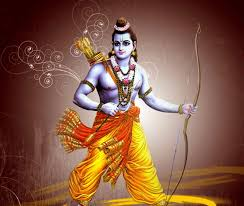 "When Rama is enthroned then the world will be highly regaled and rejoiced, exuberant and abundant, also rightly righteous, trouble-free, disease-free, and free from fear of famine..." Thus Narada is foreseeing the future and telling Valmiki. [1-1-90]
"When Rama is enthroned then the world will be highly regaled and rejoiced, exuberant and abundant, also rightly righteous, trouble-free, disease-free, and free from fear of famine..." Thus Narada is foreseeing the future and telling Valmiki. [1-1-90]
"While Rama is on the throne men will not see the deaths of their children anywhere in their lifetime, and the ladies will remain husband-devout and unwidowed during their lifetime... [1-1-91]
"In the kingdom of Rama there is no fear for subjects from wildfires, gale-storms or from diseases, and there is no fear from hunger or thieves, nor the cattle are drowned in floodwaters, as well... [1-1-92, 93a]
"This Ramayana is holy, sin-eradicating, merit-endowing, and conformable with the teachings of all Vedas... and whoever reads this Legend of Rama, he will be verily liberated of all his sins... [1-1-98]
"Any man who reads this lifespan-enriching narrative of actuality, Ramayana, the peregrination of Rama, he will be enjoying worldly pleasures with his sons and grandsons and with assemblages of kinfolks, servants et al., as long as he is in this mortal world and on his demise, he will be adored in heaven... [1-1-99]
Lord Hanuman
Hanuman is worshiped by millions around the world for his strength, bravery, dedication, unselfishness, intelligence, knowledge and virtuous nature. His Bhakti to Lord Rama was unflinching, unwavering and untainted. He is an embodiment of bhakti-yoga.
As we all know that rishis pronounced curse on Hanuman for all the mischievous deeds done on them by saying that he would never remember his valor, strength and extraordinary power until somebody reminds him of his strength before he realizes and put it to use.
Hanuman Meets Rama
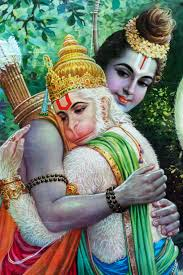 In Ramayana, Hanuman meets Lord Rama and Lakshmana for the first time in the forests and introduces himself and his master Sugriva. This is the first meeting of Hanuman with Lord Rama.
In Ramayana, Hanuman meets Lord Rama and Lakshmana for the first time in the forests and introduces himself and his master Sugriva. This is the first meeting of Hanuman with Lord Rama.
Impressed with the way Hanuman communicated, Lord Rama admired the communication capabilities of Hanuman. Rama said to Lakshmana, “This student must have studied the entire grammar and composition very carefully many a time. He has spoken so many things with meticulous accuracy. There has not been a single error in his words or pronunciation.”
Lord Rama further appreciates the communication skills, precise wording, clarity and unambiguous of this speech, moderate voice that is audible only to the listeners, pronunciation of the words of Hanuman and said that only person who is learned and knowledgeable in Vedas can speak like him.
Hanuman’s behavior, demeanor, gestures, expression, humility, cleverness, wisdom, determination and strength are unmatched. Rama himself described Hanuman thus, “Heroism, cleverness, strength, firmness, sagacity, prudence, prowess, and power have taken up their abode in Hanuman.”
Hidden Talents surfaced
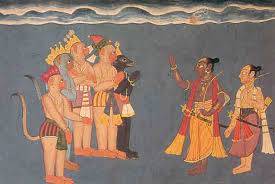 Rama, Sugriva, Jambavan and others were discussing about the ways to find about Sita’s captivity and where she may have been kidnapped to. Everybody was expressing their inability to cross the ocean to go to Lanka. Jambavan recognizing the hidden talents and strength of Lord Hanuman, he addressed him, “O Warrior, foremost among the multitude, thou who art versed in the scriptures, why art thou sitting apart, silent? In courage and strength, thou art the equal of Rama and Lakshmana and of the King of the Monkeys himself, 0 Hanuman !
Rama, Sugriva, Jambavan and others were discussing about the ways to find about Sita’s captivity and where she may have been kidnapped to. Everybody was expressing their inability to cross the ocean to go to Lanka. Jambavan recognizing the hidden talents and strength of Lord Hanuman, he addressed him, “O Warrior, foremost among the multitude, thou who art versed in the scriptures, why art thou sitting apart, silent? In courage and strength, thou art the equal of Rama and Lakshmana and of the King of the Monkeys himself, 0 Hanuman !
Many a time I have seen that all-powerful bird of immense wings and exceeding energy bearing away serpents from the ocean; the strength that is in his wings resembles the might and vigor of thine arms; none can withstand thee. Thine energy, intelligence, courage and loyalty sets thee apart from the rest of beings, therefore prepare thyself to cross the ocean … Only you are capable of reaching Lanka and carry out the task … you are the one who can fly and reach the highest area in the sky more than what anyone else can do … Oh Hanuman, Rise up! Leap across the ocean.”
Sugriva also spoke about his extraordinary qualities, “O Hanuman, certainly in you exist strength, intelligence, valor, prudence, and the ability to act properly according to time and place, O Pandita.”
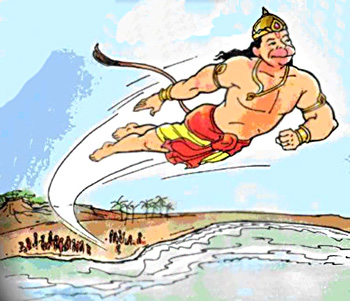 As Hanuman became aware of his own powers, being reminded, great enthusiasm welled up in him. He stood up and after glancing at them and began to grow. His companions were astonished. As they went on praising him, his stature grew. He grew so tall that he could jump across the sea. Still he was very modest. He bowed to the elders and said, \”I am the son of the Wind God who can move in the skies without touching the earth. If need be, I can throw skyward all the water of this ocean and make the three worlds float on water. I will go like lightning and surely find Sitadevi."
As Hanuman became aware of his own powers, being reminded, great enthusiasm welled up in him. He stood up and after glancing at them and began to grow. His companions were astonished. As they went on praising him, his stature grew. He grew so tall that he could jump across the sea. Still he was very modest. He bowed to the elders and said, \”I am the son of the Wind God who can move in the skies without touching the earth. If need be, I can throw skyward all the water of this ocean and make the three worlds float on water. I will go like lightning and surely find Sitadevi."
In Sundara Khanda he is described as the most powerful and intelligent.
Atulita-bala-dhaamam Svarnashailaabha-deham
Danujavana-krushaanum gnaninaam-agraganyam
Sakala-guna-nidhaanam vaanaraanaam-adhisham :
Raghupati-vara dutam vaatajaatam namaami.
Here Hanuman is described as the one who is the seat of immense strength; exalted as the mine of all virtues. The wisest among all. The fire against the forest of demons. He is bearing a shining physique like a golden mountain with immense strength. He is the master of all monkeys and the great messenger of Lord of Raghu's Race Sri Ram. I prostrate before such a son of the wind God.
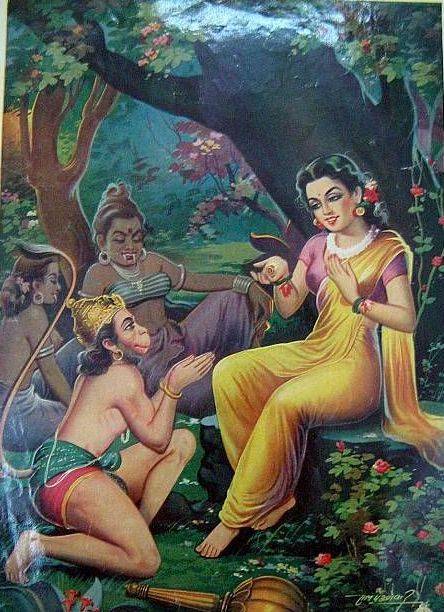 In Lanka, Sita Devi was wailing in Ashoka Vana eagerly waiting for Rama to kill Ravana and take her back to Ayodhya. At one point she was desperate and thought of committing suicide. Then Hanuman realizing the mood of Sita Devi, he started narrating the whereabouts of Lord Rama and the plans to bring back her back to the kingdom. Sita was pleased, impressed and convinced of his trustworthiness. She blessed him by saying, “You are intelligent, smart, resourceful, the best among monkeys. You shall remain immortal and a treasure of virtues. You will enjoy the affection of Sri Rama.” Hanuman met Sita in Ashoka Vana, appraised of Ram’s efforts to bring her back, and returns to Kishkinda appraise of his mission to find Sita. Rama was excited and elated and was anxious to hear the whereabouts of Sita. He was overjoyed to hear the words of Hanuman. He said of his efforts as, “A very outstanding work, the most arduous in the world has been done by Hanuman, which could not be carried out even in thought by any other on the surface of this earth.” Further she said, “So long as this world will speak about Rama, you will stay in this world to listen to the praise of Rama and the world shall be benefited with your presence… That servant to whom his master entrusts a difficult task and who performs it with zeal is said to be a superior person.” Rama said that he was indebted to Hanuman for his marvelous and superhuman deeds.
In Lanka, Sita Devi was wailing in Ashoka Vana eagerly waiting for Rama to kill Ravana and take her back to Ayodhya. At one point she was desperate and thought of committing suicide. Then Hanuman realizing the mood of Sita Devi, he started narrating the whereabouts of Lord Rama and the plans to bring back her back to the kingdom. Sita was pleased, impressed and convinced of his trustworthiness. She blessed him by saying, “You are intelligent, smart, resourceful, the best among monkeys. You shall remain immortal and a treasure of virtues. You will enjoy the affection of Sri Rama.” Hanuman met Sita in Ashoka Vana, appraised of Ram’s efforts to bring her back, and returns to Kishkinda appraise of his mission to find Sita. Rama was excited and elated and was anxious to hear the whereabouts of Sita. He was overjoyed to hear the words of Hanuman. He said of his efforts as, “A very outstanding work, the most arduous in the world has been done by Hanuman, which could not be carried out even in thought by any other on the surface of this earth.” Further she said, “So long as this world will speak about Rama, you will stay in this world to listen to the praise of Rama and the world shall be benefited with your presence… That servant to whom his master entrusts a difficult task and who performs it with zeal is said to be a superior person.” Rama said that he was indebted to Hanuman for his marvelous and superhuman deeds.
Hanuman’s role in Ramayana is unmatched, irreplaceable, eternally remembered and infinitely recognized. During the war, Indrajeet used Brahmastra rendering Rama, Lakshmana, Jambavan, Sugriva and the army unconscious. When Vibhishana reaches Jambavan to revive him from comatose, Jambavan immediately inquired whether Hanuman was alive. When Vibhishana asked him as to why is so concerned about Hanuman, Jambavan said, “If the courageous Hanuman is alive, he has the wisdom and valor to bring back to life, the entire army even if dead, but if Hanuman is dead all of us are as good as dead even if alive.”
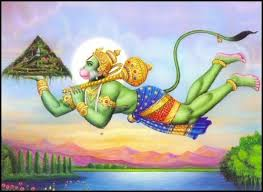 Hanuman was responsible for saving the life of Lakshmana. In a battle against Ravana, Lakshman was severely wounded and was almost on deathbed. There was no hope of reviving. Sushena, who was brought help revive Lakshman, indicated that he would die if untreated with Sanjivani herb by daybreak. Hanuman was sent to Dronagiri mountain to bring the lifesaving herb. Hanuman frantically searched for the herbs with no success. Then Hanuman ripped off the top of the mountain and flew 1000 yojanas to reach the battlefield in Lanka. Realizing that the herb would save Lakshmana’s life, Ravana ordered Surya (Sun) to dawn before its appointed time. Sensing the danger, Hanuman increased his size and kept the Sun from rising. Sushena identified the healing herbs from the mountain brought by Hanuman and administered to Lakshman. All his wounds were immediately healed.
Hanuman was responsible for saving the life of Lakshmana. In a battle against Ravana, Lakshman was severely wounded and was almost on deathbed. There was no hope of reviving. Sushena, who was brought help revive Lakshman, indicated that he would die if untreated with Sanjivani herb by daybreak. Hanuman was sent to Dronagiri mountain to bring the lifesaving herb. Hanuman frantically searched for the herbs with no success. Then Hanuman ripped off the top of the mountain and flew 1000 yojanas to reach the battlefield in Lanka. Realizing that the herb would save Lakshmana’s life, Ravana ordered Surya (Sun) to dawn before its appointed time. Sensing the danger, Hanuman increased his size and kept the Sun from rising. Sushena identified the healing herbs from the mountain brought by Hanuman and administered to Lakshman. All his wounds were immediately healed.
For all his numerous selfless services done to Lord Rama and saving the lives of numerous characters in Ramayana, almost at the end of the great epic, Lord Rama offered him liberation as a reward. Hanuman did not accept it, in fact, he did not want anything in return other than expressing his desire to do more service. “Even though liberation destroys the bondage of material existence,” 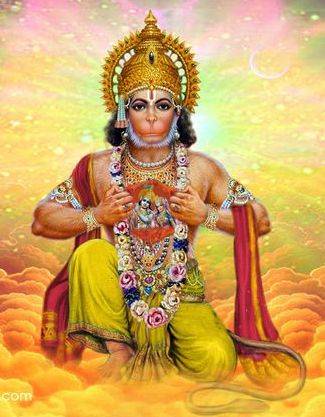 Hanuman told Rama, “I have no desire for liberation, in which I would forget that You are the master and I am Your servant.” He wanted to remain in this Bhuloka, to propagate the virtues and the principles of Rama, and remain here as long as the names of Lord Rama area chanted. Then Rama goes on to make Hanuman immortal in the hearts his devotees: “I bless you and offer a boon that you shall have a permanent seat wherever my story is recited, heard, told, read or written. You will be known as Veer (powerful) Hanuman. O son of wind, whosoever takes your name, seeks your help, prays for assistance, whosoever remembers you in distress or difficulty or calamity, that person with your blessings will become free from the trouble. Therefore, you will also be known as Sankat-Vimochak, waiver of disaster and distress."
Hanuman told Rama, “I have no desire for liberation, in which I would forget that You are the master and I am Your servant.” He wanted to remain in this Bhuloka, to propagate the virtues and the principles of Rama, and remain here as long as the names of Lord Rama area chanted. Then Rama goes on to make Hanuman immortal in the hearts his devotees: “I bless you and offer a boon that you shall have a permanent seat wherever my story is recited, heard, told, read or written. You will be known as Veer (powerful) Hanuman. O son of wind, whosoever takes your name, seeks your help, prays for assistance, whosoever remembers you in distress or difficulty or calamity, that person with your blessings will become free from the trouble. Therefore, you will also be known as Sankat-Vimochak, waiver of disaster and distress."
By chanting Hanuman Chalisa we all can reap the fruits of Hanuman’s strength and courage. It will invoke the dormant talents to surface among all of us and give more strength to carry on our respective duties. There is Hanuman within all of us. We have to awake the Hanuman within to realize our strengths and achieve great things in life.
Dharma
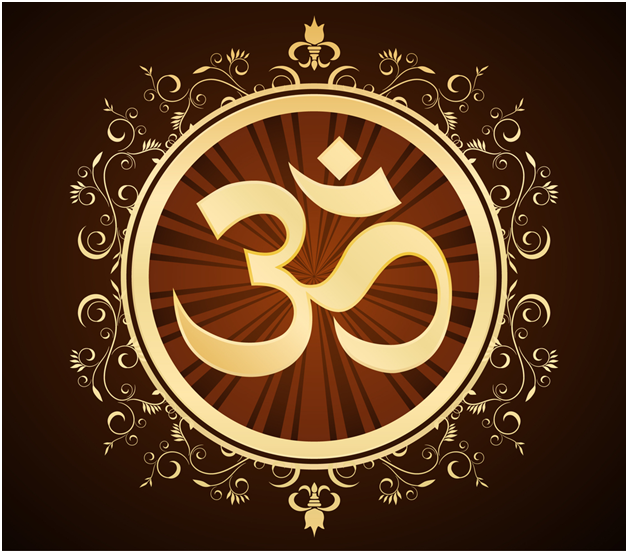 Rama is the embodiment of Dharma. Everything he has spoken and every act he has undertaken is worth emulating without any reservation. We can give many examples of his adherence to dharma in the case of accepting his father’s promise for him to exile to the forest, following the prevailing family traditions, rejection of Bharath’s request for him to return to Ayodhya, making Sugriva the King of Kishkinda, adhering to the remain ekapatnivratha (sticking with one wife), giving shelter to Vibhishana, making him the king of Lanka, following the rules in the battlefield, and respecting the talents of his enemy.
Rama is the embodiment of Dharma. Everything he has spoken and every act he has undertaken is worth emulating without any reservation. We can give many examples of his adherence to dharma in the case of accepting his father’s promise for him to exile to the forest, following the prevailing family traditions, rejection of Bharath’s request for him to return to Ayodhya, making Sugriva the King of Kishkinda, adhering to the remain ekapatnivratha (sticking with one wife), giving shelter to Vibhishana, making him the king of Lanka, following the rules in the battlefield, and respecting the talents of his enemy.
While listening to the pangs of Sugriva and how his wife was abducted by Vali, Rama said, “Dharma is the law of land of civilization, based on duty, not desire, which ensures social stability. He who upholds dharma is an Arya, or noble and he who does not is a rakshasa ….If civilization is to be stablished, people like Vali and Ravana need to be destroyed.” Dharma is followed by many of the characteristic in Ramayana and a number if statements are sprinkled all over the compendium. Rama abandoned the kingdom along with all the comforts and the health for the sake of dharma. It is his dharma to obey the commands of his father and follow the raja dharma. “The elder brother, the father and the person who imparts knowledge should be known as the three fathers if the dharma is followed.” In another instance, it states that, “stability in the dharma is the highest gain.” Sita once stated that “From dharma rises wealth, from dharma happiness. Through dharma one obtains Swarga. This world has the Dharma as its essence. Kausalya lamenting on the departure of Rama to the exile stated, “The fragrance of flowers spread along the blowing. But that of men possessed of dharma blow everywhere.”
Rama says that it is responsibility, as a Kshatriya, to rule the kingdom based on dharma and also redeem the suffering of the people. Rama says: "When the oppressed seeks relief, at the hands of a virtuous and capable person, it is supreme Dharma to protect the surrendered even at the cost of one’s own life." He has to act against any efforts to breach dharmic law. Dharma is the source of all happiness and fulfilment of all desires. In Aranya Kanda, Rama says, “Wealth comes out of Dharma. Happiness comes out of Dharma. Everything is obtainable from Dharma. Dharma is the essence of this universe. The adept attain Dharma by disciplining themselves by the conditions of Dharma, with great effort; one cannot get happiness from happiness".
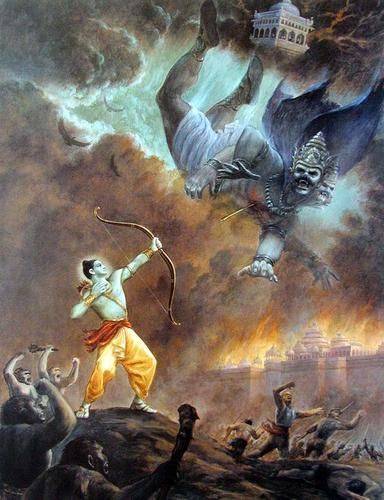 Dharma is eightfold as: "Sacrifice, Vedic study, Charity, Penance, Truth, Fortitude, Forgiveness, Non-desire."
Dharma is eightfold as: "Sacrifice, Vedic study, Charity, Penance, Truth, Fortitude, Forgiveness, Non-desire."
Bharatha followed the raja dharma scrupulously without ever wavering from the tradition. He would have taken the advantage of Rama’s exile and become a king. He could have taken the advice of the Council of Ministers to ascend to the throne. Instead he stood fast with Dharma by stating the following:
How can the rule prescribed for succession he violated? I am outside the range of that code. I have no right to occupy the throne being the younger son of the king Emperor. The rule is that the eldest son alone can succeed to the throne. Oh. Jewel among Men, so long as the eldest son is alive, I can never be the king. Therefore, return with me to Ayodhya.
One of the advisors of King Dasaratha, Jabali ties to persuade Rama to enjoy the fruits of the kingdom, and asks him not to heed father’s promise in order to live in the forest going through excruciatingly hard and dangerous life. Rama rejects his atheist argument and enunciates the importance of dharma. Rama says:
Truthfulness was one of the fundamental essentials of moral life as pictured in the Ramayana. It was held in almost divine regard by the Hindus. “Kingdom is essentially based upon truth; and this world itself is established in truth. Saints and celestials regard truth alone as all-important. In this world a truthful person attains the regions of Brahma. Untruthful persons harass people as much as serpents. In this world virtue, which is said to be the root of everything, is itself established in truth. In this world truth is the Lord; in truth is established righteousness. Everything has truth for its basis. No condition is superior to truth. The Veda, which inculcates gift, sacrifice, Homa and asceticism, is based on truth... We have heard that the gods and the Pitris (ancestors) do not accept offerings from one inclined to untruth, or who is unsteady and of volatile faculties. This duty of maintaining truth, whose influence radiates all over one’s spirit, I certainly find to be the prime one; and this burthen has (ere this) been borne by worthy people........The earth, and fame, and renown, and auspiciousness pay court unto the truthful person. The good follow truth, therefore, truth is to be sought by all.” (II: 109; 10-22)
Ravana was smitten by lust toward Sita. In spite of the advice of the emissaries such as Hanuman and Angadha, he refused to hand over Sita to Rama. He was making preparations to wage war with Rama. Malyavan tried to convince his great-nephew about his weakness that may destroy him. He reminded Ravana that he brought this war on himself because of abduction of Sita. All the Gods are on the side of Rama because he is an embodiment of dharma. The whole creation is created on the basis of good and evil actions of the those that were to be born. "He who concludes peace even with enemies or wages war at a fitting time strengthens his own party and attains a great power. A treaty of peace should be reached by a king who is weaker or equal to an enemy. The king should never underrate that enemy. If the king is more powerful, he should make war on the enemy." Malyavan advices Ravana to make alliance with Rama and avoid enmity with him. Righteous is said to be on the side of Mahatmas (high souled ones) while the unrighteousness is on the side of demons. Even great sages are alarmed at your sensual pleasures. Malyavan said, "I deem Rama of firm fortitude as Vishnu dwelling in human form. This Rama is not a mere human being, he by whom that most wonderful bridge was built across the sea. O, Ravana! Conclude peace with Rama, who is the king of men. Having come to know of his acts, let that which is good for the future be done after a mature understanding." Ravana turned his blind eye toward this advice by saying that he would not yield to any one even if he is cut into pieces.
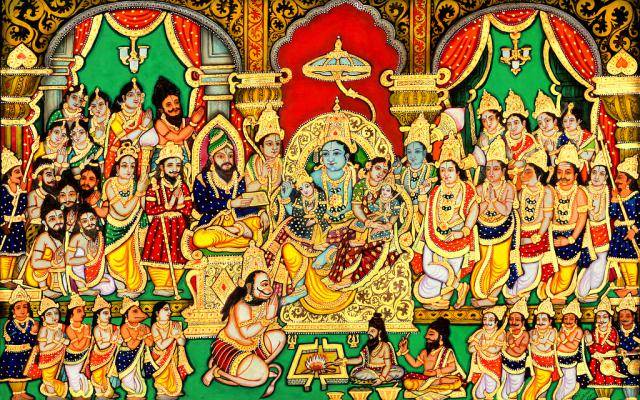 Realizing that Rama in not a mere mortal following his several failed attempts to kill Rama and Lakshmana, Indrajit pleaded his father to surrender Sita to Rama. He asked Ravana to follow the path of dharma. Indrajit said, “it appears as if the whole Nature is supporting him or else how could he be still alive? Remember, father, that in your youth, you ruled the world supported by dharma, but now you rule through adharma alone… you have made the whole world of creation suffer through your inequities… The day you abducted Sita, you took death on your lap. Dharma on the side of Rama. Dharma alone rules this world. Those who go against it will have to perish at some time or other.”
Realizing that Rama in not a mere mortal following his several failed attempts to kill Rama and Lakshmana, Indrajit pleaded his father to surrender Sita to Rama. He asked Ravana to follow the path of dharma. Indrajit said, “it appears as if the whole Nature is supporting him or else how could he be still alive? Remember, father, that in your youth, you ruled the world supported by dharma, but now you rule through adharma alone… you have made the whole world of creation suffer through your inequities… The day you abducted Sita, you took death on your lap. Dharma on the side of Rama. Dharma alone rules this world. Those who go against it will have to perish at some time or other.”
Mandodari the wife of Ravana appears to be a dharmic person. She advised Ravana not get indulged in the sinful deeds such as abducting Sita and threatening her to accept his as her husband. She reached the battlefield to look at her husband’s death body and reminisced about his weakness. She never accused Rama for killing Ravana. In fact, he acknowledges Rama as a non-mortal character. She says "This Rama is certainly a great ascetic, an eternal person, having no beginning middle or end, greater than distinguished universal spirit like Brahma, the one beyond ignorance, the nourisher, wielding a conch, a disc and a mace, wearing the 'Srivatsa' mark on his chest, of lasting beauty, incapable of being conquered, a perpetual one, being the constant soul of the universe, truly mighty, the lord of all the worlds, the prosperous one having a great splendor and Vishnu, the lord of maintenance of the world with a wish to benefit the worlds, assuming a human form surrounded by all the gods in the form of monkeys, Rama killed you, surrounded by demons. (111:17)
"In the past, by performing a great penance, you conquered the senses and conquered the three worlds. Now, as if revenging that enmity, those very senses conquered you."(111;18)
"There is no doubt that when the time comes, the doer surely reaps a harsh fruit of his sinful deed."
"The doer of an auspicious act obtains happiness, while the doer of a sinful act reaps misery. While Vibhishana has obtained happiness, you met with such an evil destiny."
Part 2 of the article will be published soon
DONATIONS
As many of you know that SaveTemple Office was opened in June 2012 in Hyderabad. Office is located in Khairatabad. Four full time employees are working on the update of our website, Aalayavani Web Radio, Aalayavani magazine, conducting various activities to preserve and protect Hindu Temples and Culture. Our budget is approximately 2 lakh rupees per month. We request your generous donation to conduct activities to promote unity among Hindus and restore the glory of Hinduism.
Please DONATE. Your donations are appreciated to continue the work.
NOTE: GHHF is exempt from federal income tax under section 501 (c) 3 of the Internal Revenue code. Our tax ID # 41-2258630
Donate at: https://www.savetemples.org (click ‘Donate’ button on right side).
Where to send your DONATIONS?
Global Hindu Heritage Foundation
14726 Harmony Lane, Frisco, TX 75035.
Your donations are tax deductible. Our Tax ID: # 41-2258630
Any questions, call: Prakasarao Velagapudi
Please subscribe to Save Temples Telegram channel at https://t.me/savetemples
GHHF Board of Directors:
Prakasarao Velagapudi PhD, ( cell), ( home); (; ); Satya Dosapati (); (); (); Vinay Boppana (248-842-6964); (); (); (); (); (); (); (); (); Murali Alloju MD (703-953-1122); Veeraiah Choudary Perni MD (330-646-8004); Vishnu Kalidindi MD; Srivas Chebrolu MD; Avadesh Agarwal; Sudheer Gurram MD; Rajendrarao Gavini MD; Srinath Vattam MD, Ravi Gandhi, Ramadevi Vadali, Kishore Kancharla, Ranjith Kumar Rikkala; Satish Kodeboyina; and Dr. Ghazal Srinivas, Honorary Brand Ambassador.
GHHF Dallas Core Group
(); Srinivas Pamidimukkala (); (); (); (); (); (}; (); (); (); (); (); (); (); (); (); (); Sitaram Panchagnula (714-322-3430); Vasanth Suri (408-239-3436); Phani Aduri (214-774-2139); Konda Srikanth (214-500-5890); Siva Agnoor (214-542-661).




















